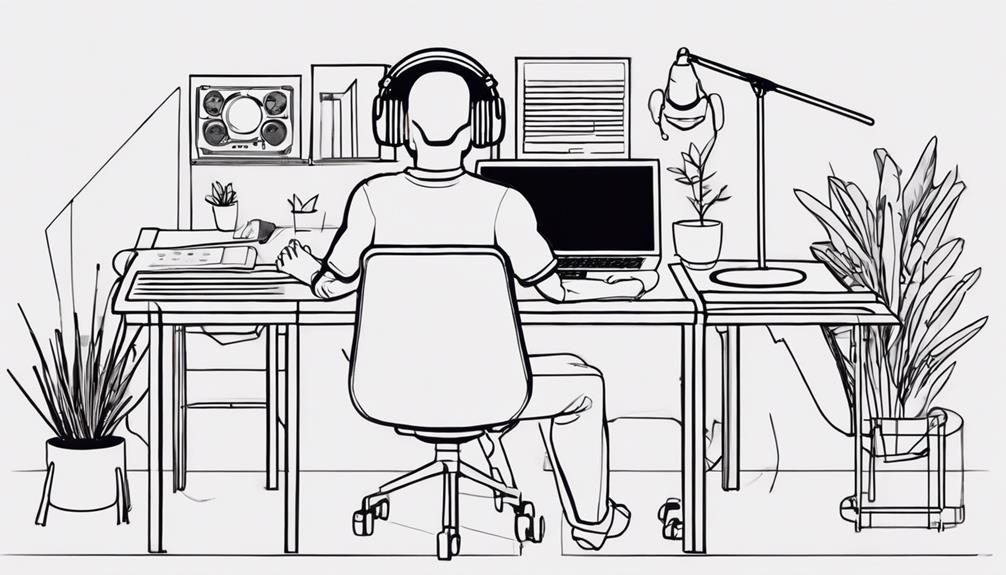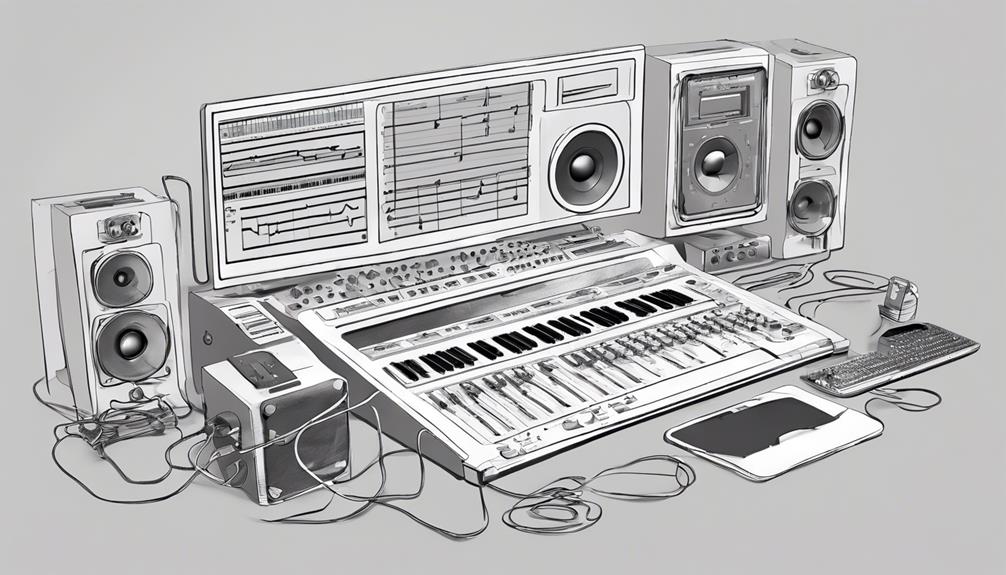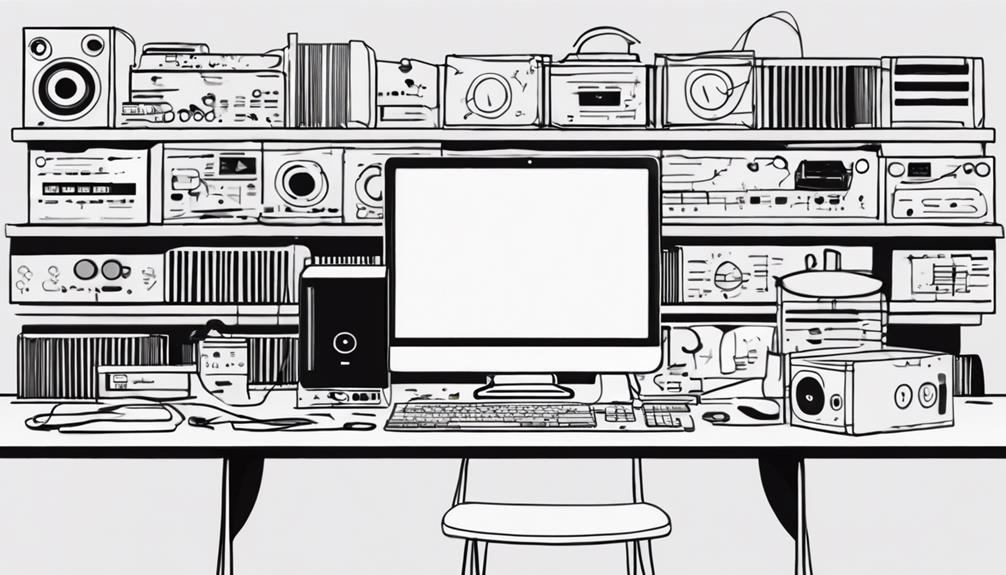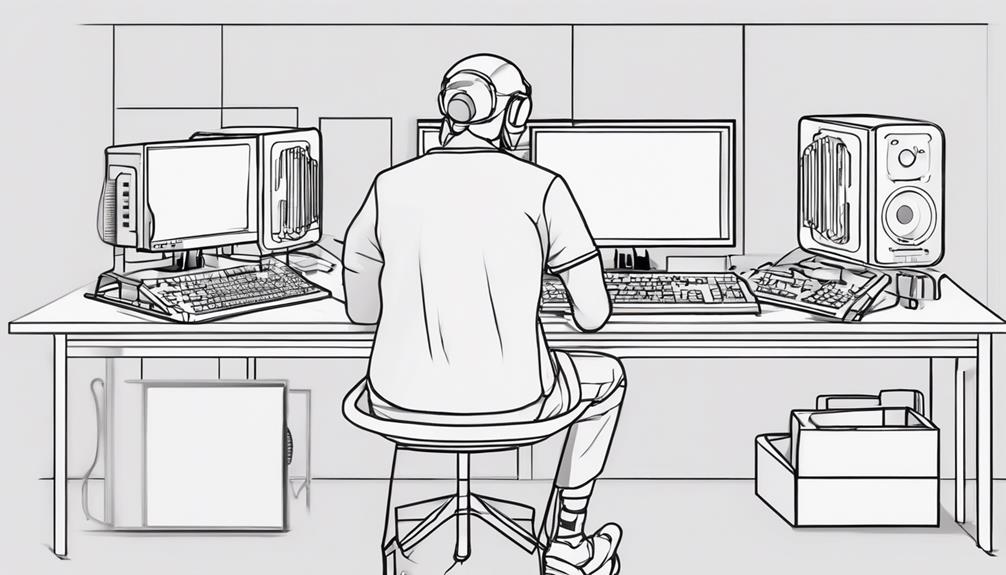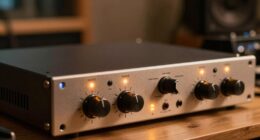To kickstart a music production company successfully, start with thorough market research to understand consumer trends. Secure start-up capital through personal savings, investments, or loans. Choose music genres based on market demand and audience preferences. Establish a suitable business structure that aligns with your goals. Obtain essential licenses and permits for legal operation. Invest in quality equipment for professional results. Select recording locations carefully for best sound quality. Develop tailored marketing strategies to engage your target audience effectively. Each step is vital in building a solid foundation for your music production venture. Additionally, focus on building a strong network of artists, producers, and industry professionals to foster collaboration and growth opportunities. Understanding how to start music production also involves cultivating a unique brand identity that sets your company apart in a competitive industry. Consistently delivering high-quality music will help establish credibility and attract a loyal customer base.
Key Takeaways
- Conduct thorough market research to understand consumer preferences and industry trends.
- Secure start-up capital through personal savings, loans, or investors.
- Select a music genre aligned with market demands and your vision.
- Choose a suitable business structure for scalability and legal compliance.
- Obtain necessary licenses, permits, and equipment for legal and professional operations.
Market Research
When starting your music production company, as a Music Producer, market research plays an essential role in guiding your decisions. Conduct thorough market research to understand consumer preferences and industry trends. By utilizing methods like surveys, focus groups, and observation, you can identify the target market's needs and wants accurately. This information allows you to tailor your music production services to meet consumer demands effectively.
Furthermore, explore understanding the spending habits of your target market. This insight helps in crafting marketing strategies that resonate with your audience and drive engagement.
In addition to consumer preferences, it's vital to analyze the music production industry landscape. By studying factors such as consumer demographics, psychographics, and trends, you gain a deep understanding of the market dynamics.
Market research not only helps you identify opportunities but also equips you to navigate challenges and assess the competition in the music production business. Make sure that your decisions are data-driven and informed by the insights garnered through thorough market research.
Start-Up Capital

When starting a music production company, understanding the different funding sources available to you is vital. Financial planning plays a significant role in determining the success of your venture.
Make sure to explore various options for start-up capital to set your business up for growth and sustainability.
Funding Sources
To establish a music production company, exploring various funding sources for start-up capital is crucial. Here are some key ways to secure the necessary funds:
- Personal Savings: Consider using your own savings to kickstart your music production company. This can provide you with full control over the finances and reduce the need for external investors.
- Venture Capitalists: Seeking investment from venture capitalists can be a viable option for those looking to scale their music production business quickly. However, keep in mind that this may involve giving up a portion of ownership in exchange for funding.
- Small Business Loans: Applying for small business loans from banks or financial institutions can provide you with the necessary start-up capital. Make sure you have a solid business plan and financial projections to increase your chances of approval.
Financial Planning
Explore the financial planning aspect of your music production company by determining the required start-up capital for equipment, studio space rental, and initial marketing expenses.
Calculate the estimated costs for software licenses, instrument purchases, and professional services such as legal and financial advice.
Additionally, consider the need for working capital to cover ongoing expenses like utilities, salaries, and maintenance costs.
To secure the necessary start-up capital, you can explore funding options such as personal savings, loans, grants, or angel investors.
It's important to create a detailed financial plan that outlines how the funds will be allocated for different aspects of your music production company's launch and operations.
Music Selection

When selecting music for your production company, be sure to choose a specific genre or style that resonates with your target audience.
Consider licensing options to secure the rights to the music you want to produce, whether through original compositions or royalty-free tracks.
Keeping an eye on current music trends and collaborating with artists can help you build a diverse and appealing music catalog.
Genre Preferences
Consider the genre of music that best aligns with your vision and goals when starting a music production company. Your genre preferences play a pivotal role in shaping the direction of your music production endeavors.
To make informed decisions, it's imperative to delve into market demand, target audience preferences, and unique production approaches within specific genres.
Here are three key points to ponder when exploring genre preferences for your music production company:
- Research Market Demand: Analyze current trends and market demands to identify genres that have a strong audience base and commercial potential.
- Understand Audience Preferences: Explore deeply into understanding your target audience's music preferences and interests to tailor your production choices accordingly.
- Explore Niche Genres: Consider delving into niche or sub-genres within broader music genres to carve out a unique identity and approach in the competitive music production landscape.
Licensing Considerations
To guarantee the legal production and distribution of music under your company, it is imperative to carefully consider licensing requirements, particularly regarding music selection. When deciding on the type of music to produce, whether commercial or non-commercial, it is essential to obtain the necessary licenses and permits for commercial music production from the Copyright Office. While non-commercial music production may not always require a license, ensuring compliance with regulations is still crucial. Make sure that the music you select aligns with the licensing requirements specific to your production company to avoid any legal issues down the line. By being diligent in understanding and adhering to licensing considerations, you can establish a solid foundation for your music production business.
| Licensing Requirements | Music Selection |
|---|---|
| Obtain commercial music production licenses from the Copyright Office | Ensure alignment of selected music with company's licensing requirements |
| Non-commercial music may require compliance with regulations | Determine the type of music (commercial or non-commercial) you want to produce |
Business Structure
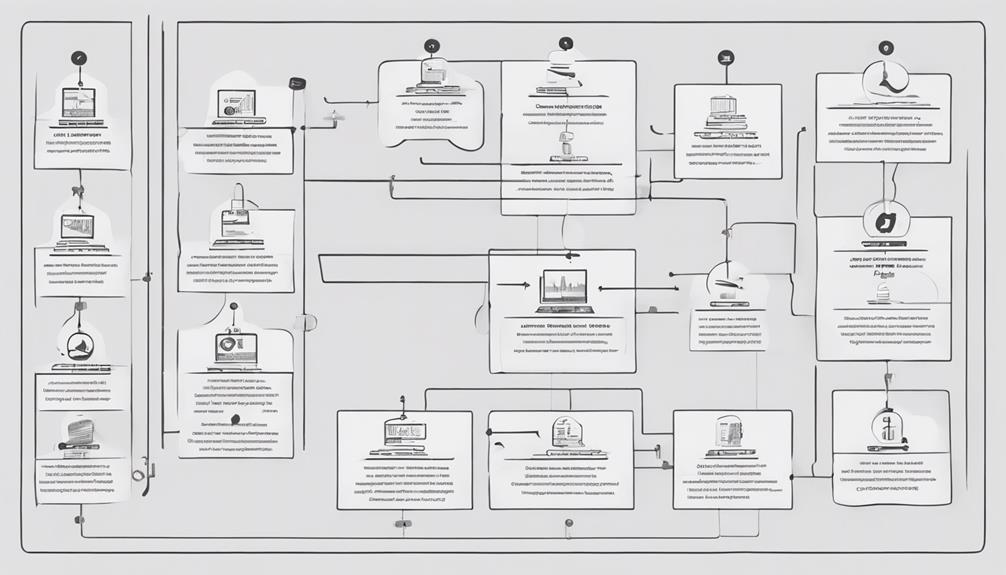
Selecting the appropriate business structure for your music production company is crucial for its legal and financial framework. When deciding on the business structure, consider the following:
- Business Structure Options: Choose between a sole proprietorship, partnership, or corporation based on your business needs and growth plans. Each structure has its own implications on legal aspects and financial matters.
- Customization to Fit Your Needs: Tailor the chosen business structure to align with the specific requirements of your music production business. This includes factors such as liability protection and tax considerations, ensuring it meets your operational and legal requirements.
- Scalability and Growth Considerations: Keep in mind the scalability and long-term growth potential of your music production company when selecting a business structure. Ensuring it aligns with your expansion plans can help streamline operations, protect assets, and optimize tax planning for sustainable growth.
Licenses & Permits

Obtain the necessary licenses and permits to legally operate your music production company and protect intellectual property rights.
As an essential step in starting your venture, obtaining a license from the Copyright Office for commercial music production is necessary to safeguard intellectual property rights. Even for non-commercial music production, it's important to comply with copyright laws to avoid legal issues.
Additionally, securing a business license from state and local governments is required to operate your music production company legally. By ensuring compliance with licensing regulations, you not only prevent legal complications but also maintain credibility within the industry.
Remember to acquire all the necessary permits for your music production operations, such as zoning permits for studio locations or event permits for live productions.
Taking these licensing and permitting steps is fundamental to establishing a solid foundation for your music production company and operating within the legal boundaries of the industry.
Equipment Needs

Make sure your music production company is equipped with the necessary tools to create high-quality audio by investing in essential equipment such as computers, digital audio workstations, studio monitors, and MIDI keyboards.
Setting up a home studio requires attention to detail in selecting the right gear to guarantee professional results. Here are three key equipment needs to take into account:
- Studio Monitors: These specialized speakers are vital for accurately monitoring the sound of your music productions. Investing in quality studio monitors helps you make informed decisions about mixing and mastering your tracks.
- Audio Interface: An audio interface is essential for connecting your instruments, microphones, and studio monitors to your computer. It serves as the bridge between analog and digital audio signals, ensuring high-fidelity recordings in your home studio setup.
- High-Quality Microphones: For recording vocals and instruments, investing in high-quality microphones is essential. Different microphones cater to various sound sources, allowing you to capture clear and pristine audio for your music productions.
Recording Locations
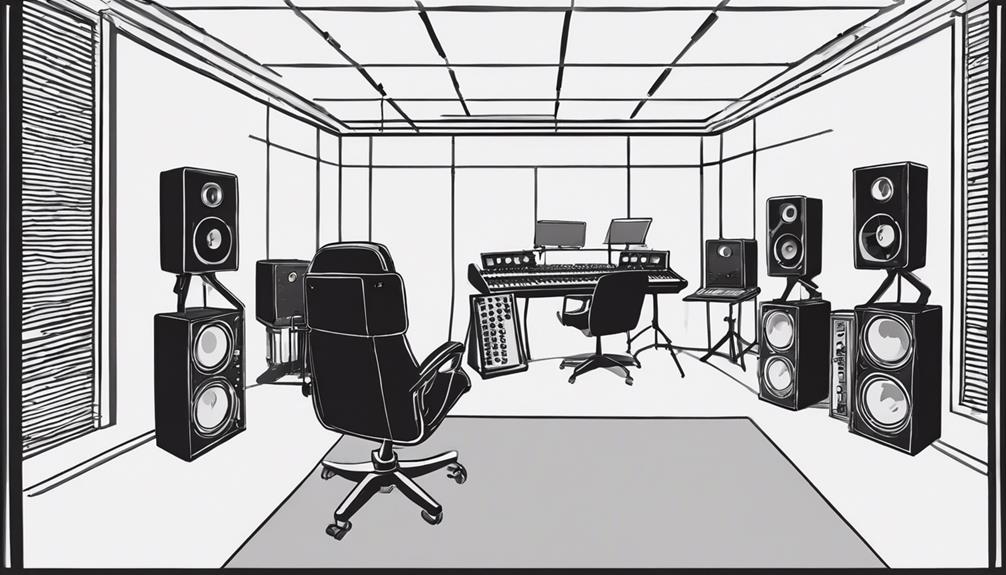
Consider the impact of recording locations on the quality and convenience of your music productions. The choice between a home recording setup or a professional recording studio can greatly influence the outcome of your projects. While home recording offers affordability and comfort, professional studios provide excellent equipment and acoustics. When deciding on a recording location, factors like sound quality, noise control, and accessibility must be taken into account. It's important to select a spot that allows for minimal disturbances and can be effectively soundproofed to guarantee the best recording conditions for both artists and clients.
| Recording Locations | Home Recording | Professional Recording Studio |
|---|---|---|
| Cost | Affordable | Higher cost but high quality |
| Sound Quality | May lack acoustics | Superior acoustics and equipment |
| Convenience | Comfort of home | Specialized environment for music |
Before finalizing a location, research local regulations and permits to make sure your recording studio operates legally and without any issues.
Marketing Strategies

To effectively promote your music production company, start by conducting thorough market research to understand your target audience's preferences and behaviors. By delving into your target market preferences, you can tailor your marketing strategies to resonate with potential clients effectively.
Here are some key steps to enhance your marketing skills and leverage consumer insights:
- Utilize Surveys and Focus Groups: Engage with your target audience through surveys and focus groups to gather valuable feedback on their music production needs and preferences.
- Data-Driven Approaches: Implement data-driven marketing approaches to analyze consumer insights and develop personalized strategies that align with your audience's desires.
- Positioning Strategies: Understand consumer needs and wants to effectively position your music production company in the market, highlighting your unique selling points and benefits.
Frequently Asked Questions
How to Start Being a Music Producer?
To start being a music producer, learn music theory, master production software like Ableton Live, understand DAW features, study sound synthesis, and explore career opportunities. Build skills in composition, mixing, mastering, and audio manipulation techniques.
How to Create a Music Company?
To create a music company, start by registering it as an LLC for protection and tax benefits. Craft an operating agreement, get licenses, and secure an EIN. Develop a solid business plan to define goals, target market, and growth strategies.
How Do You Make Music Production Step by Step?
To start the process of music production gradually, begin by refining music theory skills, mastering production software, and learning about sound synthesis. Immerse yourself in mixing, mastering, and various genres to develop a distinctive sound. Continue to experiment and evolve!
Should I Start an LLC as a Music Producer?
Starting an LLC as a music producer can provide limited liability protection, tax advantages, and a more professional image. It helps separate personal and business finances. Consider filing articles of organization, creating an operating agreement, and obtaining an EIN.
Conclusion
Now that you have all the steps laid out, it's time to get started on building your music production company! With careful planning and determination, you’ll be well on your way to turning your passion for music into a thriving business. As you navigate the journey of learning how to start a music company, be sure to focus on building strong industry connections and defining your unique brand. Remember, success comes from consistent effort and a clear vision for the future of your company.
With a little hard work and dedication, you'll be on your way to creating the next big hit.
Remember, the sky's the limit when it comes to your success in the music industry.
So go out there and make your dreams a reality!


